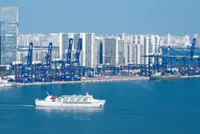FACING a migration quagmire on the French island territory of Mayotte, off Africa’s east coast, France’s government has sent in 2,000 troops and police to carry out mass expulsions, destroy slums and eradicate violent gangs.
But the operation has become bogged down and raised concerns of abuse, aggravating tensions between local residents and immigrants from the neighbouring country of Comoros. It is also laying bare entrenched poverty among both communities, tensions over the island’s status – and deep inequalities between Mayotte and the rest of France.





